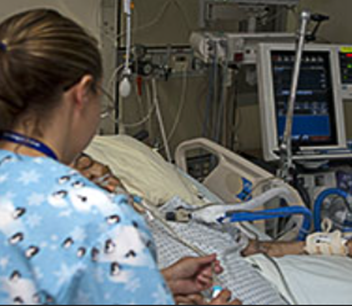Hi, it’s Patrik Hutzel from INTENSIVECAREHOTLINE.COM where we instantly improve the lives for Families of critically ill Patients in Intensive Care, so that you can make informed decisions, have PEACE OF MIND, real power, real control and so that you can influence decision making fast, even if you’re not a doctor or a nurse in Intensive Care!
This is another episode of “YOUR QUESTIONS ANSWERED”n and in last week’s episode I answered another question from our readers and the question was
You can check out last week’s question by clicking on the link here.
In this week’s episode of “YOUR QUESTIONS ANSWERED” I want to answer questions from one of my clients, Abby, as part of my 1:1 consulting and advocacy service! Abby’s mom is critically ill in the ICU and she is asking why is it crucial to have access to her mom’s medical records & track her progress.
Why Is It Crucial to Have Access to My Mom’s Medical Records in ICU & Track Her Progress?

Abby: Hello Patrik. It’s Abby. I am calling for my mom.
Patrik: Hi Abby! Yeah sure. Can you tell me more about your mom?
Abby: I have the information for my mom. She has ARDS (acute respiratory distress syndrome) and they are discussing her renal failure.
Patrik: Cool. Well, all that I can say there is from my experience, a lot of patients with ARDS are going to kidney failure as well. So, I’m not overly surprised to hear that. Are they putting her on a dialysis machine?
Abby: I don’t know, they didn’t say yet.
Patrik: Right.
Abby: And then I had cancer doctors, they said they should continue heroic measures possibly because if the kidney if it was long-term or whatever. What usually happens with this type of patients? Just asking you.
Patrik: You’re asking me what’s my opinion, what usually happens with this type of patient?
Abby: Yeah, well what happens, yeah?
Patrik: Sure, yeah, yeah. How old is your mom?
Abby: 75
RECOMMENDED:
Patrik: Okay. If your mom could make her own decision, what would she want?
Abby: It would depend on if it was permanent or temporary thing.
Patrik: I guess the question here is, it’s hard to say whether it is a permanent or a temporary thing, I guess that’s the hard thing to predict. From what I gather from your email, Abby, you were saying she’s got multiple myeloma, is that correct?
Abby: Yes, and she’s responded for about 20 years.
Patrik: Oh, okay, right.
Abby: They are trying these very different drugs and I am wondering if her body is okay with it.
Patrik: Right, right, okay, so.
Abby: That’s the problem.
Patrik: Right. Tell me a little bit more, how many days has she been in ICU now?
Abby: She’s just arrived in ICU. She went to the hospital on Sunday, and she wasn’t progressing there on step-down unit. And then she ended up in the ICU a couple of days ago.
Patrik: Okay, so this is really plus 48 hours in ICU?
Abby: Yeah.
Patrik: Okay. Well, that’s not a long time. You know, I mean, to say after 48 hours in ICU, this patient should have comfort care. I do believe it’s very premature.
Abby: Way too early to say, thank you for being honest with me. I wanted to have an independent opinion away from family members, kind of a thing. Don’t mind me, I’m on their side but I wanted to have somebody else perspective.
Patrik: Sure.
Abby: To not have a family member involved.
Patrik: Right, right.
Abby: So, you think it’s way too early at this point?
Patrik: Right, way too early. I guess, I need to know more. Do you know if that diagnosis for ARDS is final diagnosis, or are they still sort of? Have they told you, “Yep, she’s got ARDS. And this is why.” Or are they still sort of.
Abby: They didn’t say that she had ARDS. When they went to the hospital, she had medications for pneumonia. And having to turn her over in a prone position based what, you know, is that correct?
Patrik: Oh, they do prone patients for ARDS, that is one of the multiple options available. I gather from your email that they are trying to make you believe that prone position is the only treatment option for ARDS, is that what I’m reading from your email?
Abby: No. What was weird is that her oxygen saturation was 96%, 70%, and she had normal blood pressure. And then they wanted to put her in a prone position because the ratio was too low.
Patrik: Yep, okay, okay. But again, what I gather from your email, and maybe you can correct me if I’m wrong. It sounds to me like from your email that they have tried to make you believe that the prone position is the only treatment option for ARDS, or am I misunderstanding that?
Abby: I don’t know what’s available, I just did…
Patrik: Yeah okay, let’s.
Abby: Yeah, I have information I’m told, that doesn’t mean, I don’t know. I’m no doctor or.
Patrik: Sure, sure. No, no, let’s walk through some treatment options that I am familiar with for ARDS, especially if oxygen requirements are going up, which sounds like they do, if she’s on 70% off FiO2 on the ventilator, so let’s quickly go.
Abby: They said today she was on the middle reading ventilator right now.
Patrik: Right, it would be good.
Abby: Is that higher or lower?
Patrik: When you say a middle reading, is that what you said?
Abby: Middle.
Patrik: I couldn’t tell you, and I’ll tell you why. When someone is on a ventilator, I would need to look at the whole screen, it’s very nuanced, 70% of FiO2 very high. But there are other parameters that come into play to put the 70% in perspective. It would be very helpful if you had a picture of the ventilator at some point.
Abby: Yeah.
Suggested links:
Patrik: Treatment options for ARDS. Yes, proning for sure, that can help. But there are other treatment options such as nitric oxide, for example. Have you heard of nitric oxide?
Abby: Yeah.
Patrik: Right. Nitric oxide is a treatment option. There are medications out there such as prostacyclin also known as epoprostenol nebulizer that’s another treatment option for ARDS. Depending on whether your mom’s heart is working or not working. There could also be a treatment option, I’m sure you’ve heard of it, just not in combination with ARDS is Viagra, is also a treatment option sometimes, depending on what the heart is doing.
Another treatment option for ARDS patients, predominantly for ages less than 65 is ECMO. I think you are saying in your email, I asked about ESOC, I’m not sure what you mean by ESOC.
Abby: ECMO (extracorporeal membrane oxygenation).
Patrik: ECMO, yeah, yeah. So, it is very unlikely that they will put your mom on ECMO simply because of her age. ECMO beds are in very short supply, and they’re unfortunately, whether it’s in the U.S., UK, Australia, the age cutoff is generally speaking around 65 for ECMO patients.
Abby: Okay and thank you so much. I know you charge for compensation. How much is your charge for services if I need you to talk to the ICU doctors or nurse?
Patrik: Yes, yeah, no, for sure. Look, it really depends, I have several options. It really depends on how much access you want to make. Could go from unlimited access for a 30-day period, to an unlimited access option for a 2-week period for a 1-week period, for a 4-day period. You could just book me for an hour.
I also have the membership option where you have access to me and my team online. That’s obviously the most cost-effective option. So, I have several options, which I can just email to you then you can have a look and select what works best for you.
Abby: Thank you for being honest. Two days it’s not anywhere near…
Patrik: No, it’s not, look.
Abby: You don’t consider a step-down unit ICU there.
Patrik: Not necessarily, not necessarily. Look, it really depends, there’s also different ICUs have different levels of step-down.
Abby: Progressive care.
Patrik: Right. That’s right, progressive care, step-down ICU are the terms that are being used as high dependency unit. Sort of the terms are interchangeable. Look, it really depends. The step-down is predominantly a thing when patients come out of ICU, but there’s also patients going into step-down ICU to begin with, and then they sometimes escalate to ICU. Is that’s what’s happened with your mom?
Abby: Yeah.
Patrik: Right. Was she on BiPAP in step-down? She was on a nasal cannula.
Abby: She was on a nasal cannula. Nasal cannula.
Patrik: Nasal Cannula.
Abby: She was on 4 milliliters oxygen. And she ended up on the ventilator.
Patrik: Right.
Suggested links:
Abby: She went from 4 milliliters to a high flow nasal cannula then to a ventilator.
Patrik: Right, okay.
Abby: And was with that for about 24 hours.
Patrik: Right, okay. They didn’t try BiPAP.
Abby: No.
Patrik: Right, do you know why they didn’t try BiPAP?
Abby: I don’t know.
Patrik: Fair enough, fair enough.
Abby: And she had sleep apnea. She had wanted to wear the BiPAP/CPAP mask.
Patrik: Right. Okay, I can see why they potentially would have ventilated her straight away with sleep apnea, yeah. Okay, thanks for that information, I think that is important information. But other than with the multiple myeloma, does she have any other significant pre-medical history?
Abby: No.
Patrik: So, prior to this hospital admission, fit and…?
Abby: She had pneumonia. She was in a different hospital, they shifted her about four weeks earlier. But she wasn’t in ICU.
Patrik: Right. Okay, do you know if she’s on any vasopressors or inotropes such as norepinephrine, phenylephrine, epinephrine? Have you heard of that?
Abby: I can email you her list of medication she’s taking.
Patrik: Sure, of course. The more information the better. I guess by the same token, the reason I’m asking for either inotropes or vasopressors, specifically…
Abby: She was on a blood pressure medication.
Patrik: That’s what I mean by that. Yeah, that’s what I mean, but do you know?
Abby: Just give me a second.
Patrik: Thank you.
Abby: I saw some potassium chloride.
Patrik: Sure. Yeah, that’s almost standard for ICU patients because they’re losing potassium pretty quickly.
Abby: So that’s what she was on.
Patrik: Right, okay. Look, the reason I’m asking for vasopressors or inotropes specifically is, if she was on them, that would be sort of the next level of life support required.
Abby: You know, she wasn’t on that in ICU.
Patrik: Okay, sure. Right, I was more specific, what is she on in ICU at the moment because sort of that would give me.
Abby: I would have to have you call the doctor.
Patrik: Yeah, sure, sure. Look, the other thing, Abby, that I would recommend no matter what you decide, with the consulting going forward. I would strongly suggest for you to get access to the medical records one way or another. In this day and age, they should just send you a link to a website with a username and a password. And you should have access to the medical records in no time, you know?
Abby: She’s a darn older person, I’d have to go to her doctor to get charts or whatever, basically.
Patrik: No, no, not at all. Not at all. Most hospitals now have access to a website, it’s called mychart.org.
Abby: Okay.
Patrik: And they should just give you a username and a password, and you should be able to access the medical records almost in real-time.
Abby: Okay, I have the printouts of my chart, would you like to those?
Patrik: Oh, yeah. Again, Abby, the more information the better. It’s like I believe with clinical information at the moment we’re only scratching the surface, we’re only scratching the surface.
Abby: Let me know what I can do to help.
Patrik: I tell you what, just ask them when, I assume you are visiting her?
Abby: What?
Patrik: I assume you are seeing your mom in ICU?
Abby: She is sedated, I can’t see her right now.
Patrik: Sure. No, no, but you can visit her, nevertheless?
RECOMMENDED:
Abby: Yeah, I can, yeah.
Patrik: So just ask the hospital, just ask them. I’ll send you a link to myChart so you can see what it is, but as I said most hospitals now, unless they’re really, really old fashioned then they only have a paper-based system, which some hospitals are still old fashioned. But most of them are, now it’s all electronic. It’s worth for you asking if for whatever reason they don’t have the myChart. Fair enough, but most I’d say 9 out of 10 hospitals now have access to my chart.
Abby: Okay.
Patrik: Abby, I need to move along. What I’ll do as the next step is, I will email you my consulting and advocacy options. I’ll send you a link to the myChart website just to verify what I’m saying there. And then I look forward to hearing from you.
Abby: Thank you so much.
Patrik: It’s a great pleasure. All the best to you and your family for now.
Abby: Thank you.
Patrik: Thank you, bye-bye. Bye.
The 1:1 consulting session will continue in next week’s episode.
How can you become the best advocate for your critically ill loved one, make informed decisions, get peace of mind, control, power and influence quickly, whilst your loved one is critically ill in Intensive Care?
You get to that all important feeling of making informed decisions, get PEACE OF MIND, CONTROL, POWER AND INFLUENCE when you download your FREE “INSTANT IMPACT” report NOW by entering your email below!
In Your FREE “INSTANT IMPACT” report you’ll learn quickly how to make informed decisions, get PEACE OF MIND, real power and real control and how you can influence decision making fast, whilst your loved one is critically ill in Intensive Care! Your FREE “INSTANT IMPACT” Report gives you in-depth insight that you must know whilst your loved one is critically ill or is even dying in Intensive Care!
Sign up and download your FREE “INSTANT IMPACT” REPORT now by entering your email below! In your FREE “INSTANT IMPACT” REPORT you’ll learn how to speak the “secret” Intensive Care language so that the doctors and the nurses know straight away that you are an insider and that you know and understand what’s really happening in Intensive Care! In your FREE report you’ll also discover
- How to ask the doctors and the nurses the right questions
- Discover the many competing interests in Intensive Care and how your critically ill loved one’s treatment may depend on those competing interests
- How to Eliminate fear, frustration, stress, struggle and vulnerability even if your loved one is dying
- 5 mind blowing tips & strategies helping you to get on the right path to making informed decisions, get PEACE OF MIND, control, power and influence in your situation
- You’ll get real world examples that you can easily adapt to you and your critically ill loved one’s situation
- How to stop being intimidated by the Intensive Care team and how you will be seen as equals
- You’ll get crucial ‘behind the scenes’ insight so that you know and understand what is really happening in Intensive Care
- How you need to manage doctors and nurses in Intensive Care (it’s not what you think)
Thank you for tuning into this week’s YOUR QUESTIONS ANSWERED episode and I’ll see you again in another update next week!
Make sure you also check out our “blog” section for more tips and strategies or send me an email to [email protected] with your questions!
Also, have a look at our membership site INTENSIVECARESUPPORT.ORG for families of critically ill Patients in Intensive Care here.
Or you can call us! Find phone numbers on our contact tab.
If you want a medical record review, please click on the link here.
Also check out our Ebook section where you get more Ebooks, Videos and Audio recordings and where you can also get 1:1 counselling/consulting with me via Skype, over the phone or via email by clicking on the products tab!
This is Patrik Hutzel from INTENSIVECAREHOTLINE.COM and I’ll see you again next week with another update!







